9 Best Physics Courses for 2025: Learn Physics Online
Learn physics online from top instructors at MIT, Yale, and Rice University, and others!

Quick Access:
- General Physics Courses: Intro to Physics, How Things Work, Fundamentals of Physics, With Free Certificate, With College Credit
- Specific Topics: Mechanics, Electricity, Basic Special Relativity, Higgs Boson.
Trying to find “the best” can be daunting, even for those of us who live and breathe online courses. I’ve browsed the Class Central catalog and the internet to find worthy courses for this Best Courses Guide (BCG). In the guise, you’ll find some general physics courses, plus top rated courses in various subfields. Please note, if you want the best Quantum Mechanics, Relativity, or Astronomy courses, these are covered in specific BCGs.
While some of these courses have been created specifically for online learning, others are recordings of in-class university lectures.
The first few courses in this BCG assume no prior knowledge, but for the university-level courses, you might need high school science, plus mathematics, calculus, and linear algebra. You can search the catalog or other sites such as Khan Academy for resources to fill any gaps in your knowledge.
Click on the shortcuts for more details:
- Top Picks
- What is Physics?
- Courses Overview
- What Else?
- Why You Should Trust Us
- How We Made Our Picks and Tested Them
Here are our top picks
Click on one to skip to the course details:
What is Physics?
Physics is a branch of science that studies matter, energy, and forces of nature. It seeks to understand the behavior of the universe at every scale, from subatomic particles to the largest galaxies. Physics aims to uncover the laws and principles governing the interactions and transformations of matter and energy. Physics principles explain everyday phenomena, from why the sky is blue to how a refrigerator works.
Key areas of physics include:
- Classical mechanics: motion, forces, and energy in macroscopic systems
- Electromagnetism: electric and magnetic fields, and their interactions with matter
- Thermodynamics: heat, work, temperature, and the laws governing their interactions
- Quantum mechanics: matter and energy at the smallest scales, including the behavior of subatomic particles
- Relativity: space, time, and gravity, especially at high velocities and in strong gravitational fields
- Nuclear and particle physics: the components and behavior of atomic nuclei and fundamental particles.
You may need physics for these careers:
- Technology, industry, and engineering: designing and building computers, smartphones, medical equipment, and all types of vehicles. Become a software developer, data scientist, systems analyst, or optical engineer
- Defense: many applications including ground, air, and space
- Energy production: electromagnetism, geophysics, and thermodynamics help in developing power plants, solar panels, nuclear reactors, and other energy sources
- Medical applications: crucial in medical imaging (e.g., X-rays, MRI), radiation therapy, and understanding biological processes
- Environmental science: meteorology and climate science, developing renewable energy sources, and understanding ecological systems
- Space Exploration: design of spacecraft, satellites, and instruments
- Scientific Research: discoveries about the universe, from the smallest particles to the largest cosmic structures. Many positions are available, from laboratory technician to nanotechnologist
- Education and teaching: high school and university.
Physics provides foundational knowledge, driving innovation and progress.
Courses Overview
- All the courses except one are free or free to audit
- 5 courses offer a certificate of completion or college credit
- The Physics subject is followed by 104K learners on Class Central
- The most featured provider is Coursera with 3 courses.
Best Classical Mechanics Course for Beginners (University of Virginia)
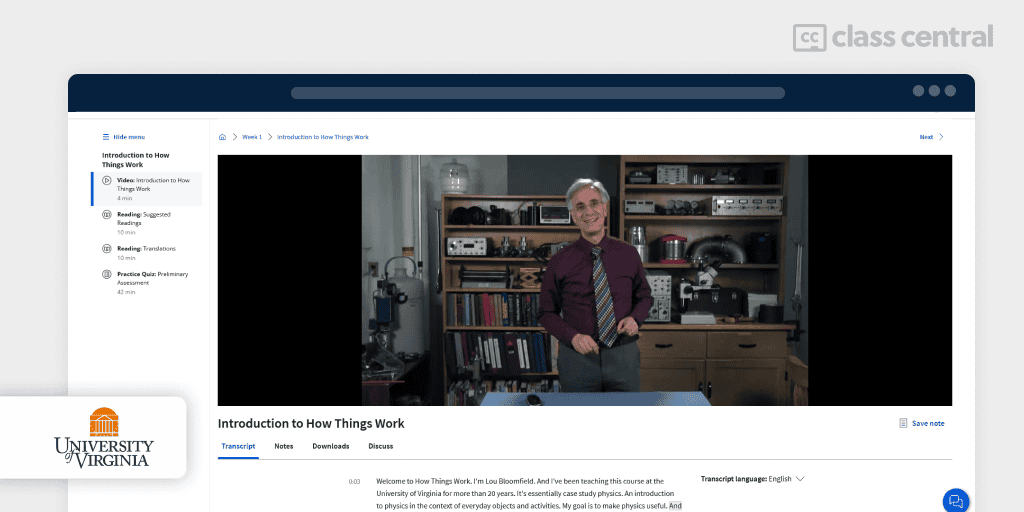
How Things Work: An Introduction to Physics is deservedly in Class Central’s Best Online Courses of All Time list. It’s a beginner-friendly course designed to explain physics principles using everyday objects. Lou Bloomfield enthusiastically explains how basic physics concepts apply to everyday activities and items. Each section ends with a quiz and the course concludes with a final exam to assess your understanding. You can access the entire course for free, but pay if you want a certificate.
Syllabus:
- Introduction to basic physics principles including Newton’s first and second laws: inertia, position, velocity, acceleration, force, and mass
- Motion and mechanics
- Skating: inertia, motion principles
- Falling balls: gravity, weight, acceleration, projectile motion
- Ramps: Newton’s third law, work, energy, mechanical advantage
- Seesaws: rotational vs. translational motion, Newton’s law of rotation, angular measurements, torque
- Wheels: frictional forces
- Momentum and energy of bumper cars: impulse, angular momentum, energy relationships.
“This course had a great Professor. Light hearted, good energy, explains basic concepts well. Good diction, good examples, easy to follow.” – Ryan Burke, Class Central learner.
| Provider | Coursera |
| University | University of Virginia |
| Instructor | Louis A. Bloomfield |
| Time Commitment | 14 hours |
| Enrollment | 260K |
| Rating | 4.7/5.0 (28) |
| Cost | Free audit |
| Quizzes | Free |
| Certificate | Paid |
Best Mechanics and Electromagnetism Courses with Free Certificates (Saylor Academy)
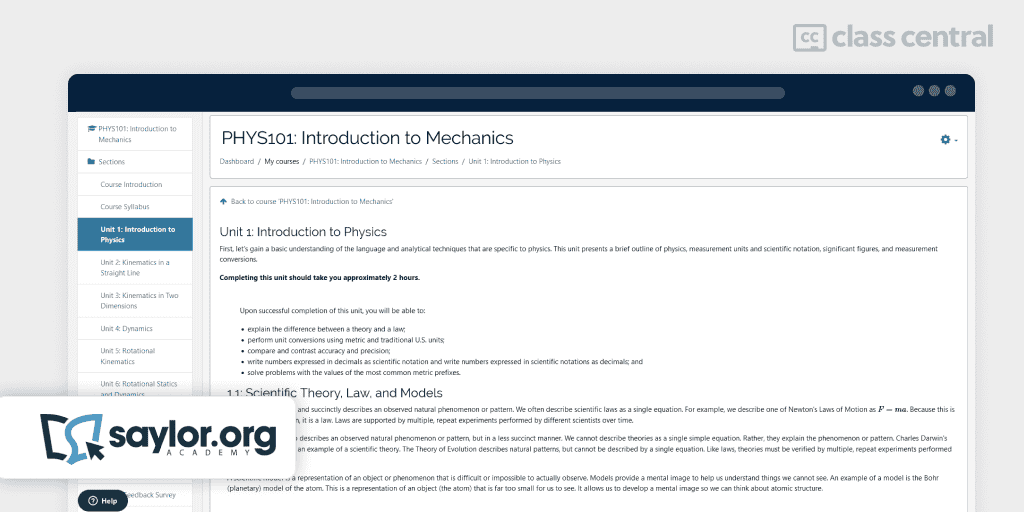
For a free, text-based course, look no further than PHYS101: Introduction to Mechanics from Saylor Academy.
Study the material, pass the exam and earn a free certificate. Or pay for online proctoring and earn college credit, but don’t forget to check if your college accepts it!
Suitable for beginners, in this course you will learn:
- Kinematics in a straight line and in two dimensions
- Dynamics
- Rotational kinematics, statics, and dynamics
- Work and energy
- Momentum and collisions.
Saylor Academy also offers PHYS102: Introduction to Electromagnetism (42 hours), again with a free certificate and optional credit.
| Provider | Saylor Academy |
| Time Commitment | 33 hours |
| Cost | Free |
| Quizzes/Problem Sets/Exam | Free |
| Certificate | Free |
Best General Physics Course with College Credit (StraighterLine)
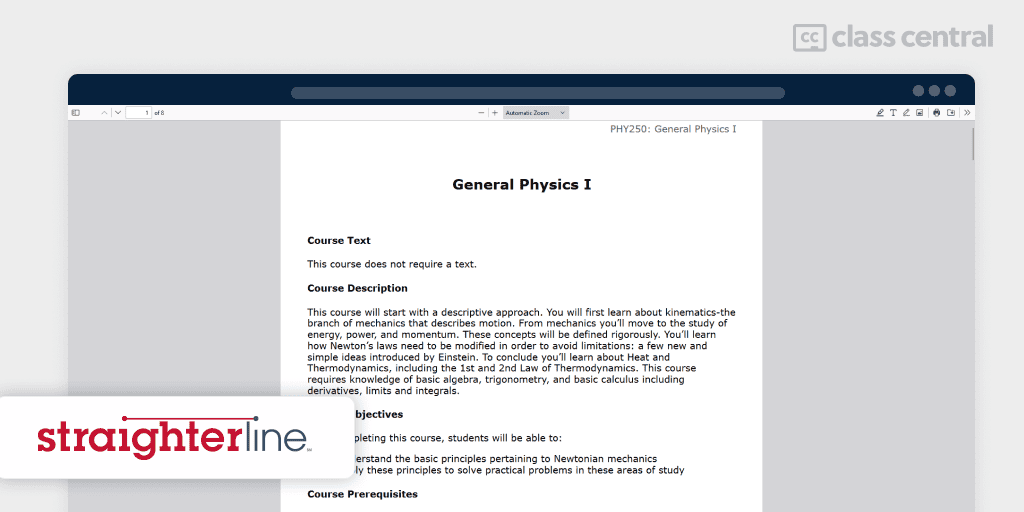
You may be able to complete General Physics I within around 30 days and earn 3 ACE credits, accepted by over 3000 institutions. Check if your institution recognises the credit towards your degree.
This math-intensive course covers fundamental physics concepts including matter, energy, and their interactions. A strong background in mathematics, including basic algebra, trigonometry, and basic calculus, is recommended.
If you need additional support, online tutoring is available for no extra cost.
Syllabus:
- Course Overview: Introduction to matter, energy, and their interactions
- Study of Kinematics: Detailed exploration of motion
- Newton’s Laws: Understanding forces and motion
- Gravity and Relativity: Concepts of gravitational forces and basic principles of relativity
- Fluids and Waves: Study of fluid mechanics and wave phenomena.
| Provider | StraighterLine |
| Time Commitment | 4-6 weeks |
| Cost | Paid |
| Quizzes/Problem Sets/Exam | Included |
| ACE College Credit | For eligible institutions |
Also Great Classical Mechanics & Electricity Course (Udacity)

Updated in March 2022, Intro to Physics is a free course that explores fundamental physics concepts through a European lens, specifically in Italy, the Netherlands, and the UK. The course covers major physics questions and topics from the past 2000 years, providing a comprehensive introduction to the subject. You don’t need any prior physics knowledge, but basic algebra will be useful.
You will learn:
- Basics of geometry and trigonometry, and how to measure the circumference of the Earth
- Motion: how objects move, data analysis and kinematics, forces, acceleration, and Newton’s Laws
- Applications of motion: how we can use motion; work, energy, and simple machines
- Navigational physics, determining longitude, simple harmonic motion
- Electricity fundamentals: what electricity is, charge and electric fields
- Modern physics and open questions, what is left to discover?
“…It covers all the fundamental aspects of the Physics fro the beginners.” – Dr Gurmeet Singh,
Class Central learner.
| Provider | Udacity |
| Instructor | Andy Brown |
| Time Commitment | 8 weeks |
| Rating | 4.1/5.0 (15) |
| Cost | Free |
| Quizzes/Problem Sets | Free |
| Certificate | None |
Best University-Level Classical Mechanics & Thermodynamics Course (Yale University)
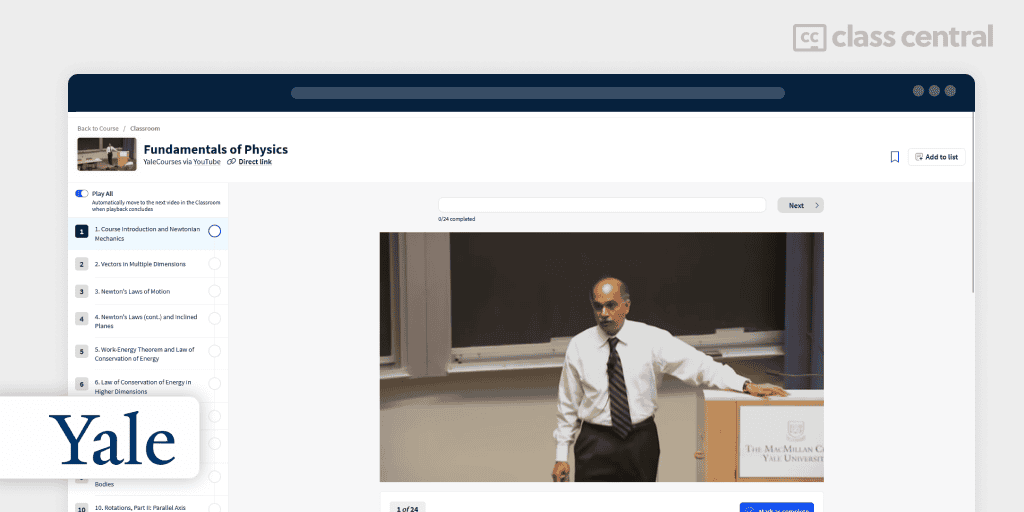
In my opinion, Fundamentals of Physics is the top of the list of university-level general physics courses. I enjoyed Professor Shankar’s humor, which helps lighten the atmosphere while teaching physics.
The free course provides a comprehensive introduction to the core principles of physics, looking in depth into several critical areas. It’s aimed at students who already have a solid foundation in physics and mathematics and focuses on enhancing problem-solving skills and quantitative reasoning.
Topics covered include:
- Newtonian mechanics and laws of motion
- Vectors in multiple dimensions and inclined planes
- Work-energy theorem and law of conservation of energy
- Kepler’s laws
- Dynamics of multiple-body system, law of rotations, and torque
- Introduction to relativity, Lorentz transformation and four-vector in relativity
- The Taylor series and other mathematical concepts
- Simple harmonic motion, waves, fluid dynamics and statics and Bernoulli’s equation
- The Boltzmann constant and first law of thermodynamics
- The second law of thermodynamics, Carnot’s engine, and entropy.
You can download the whole course including exam questions and solutions from Yale Online. You can also download the follow-up course, Fundamentals of Physics II.
Shankar is the author of several textbooks, including Fundamentals of Physics I: Mechanics, Relativity, and Thermodynamics and Fundamentals of Physics II: Electromagnetism, Optics, and Quantum Mechanics.
| Provider | YouTube |
| University | Yale University |
| Instructor | Ramamurti Shankar |
| Time Commitment | 29 hours |
| Views | 1.4M |
| Cost | Free |
| Certificate | None |
Best Range of Physics Courses (MIT)
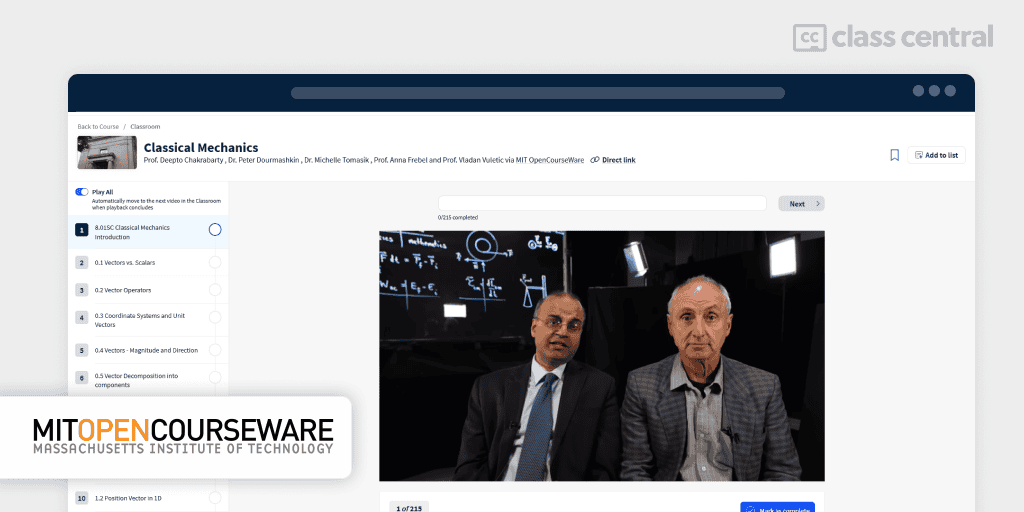
If you want to learn about many aspects of physics in depth for free, you can’t go past MIT OpenCourseWare (OCW). You’ll find lecture videos and notes, problem sets, exams, and some courses include the solutions. Certificates are not available, but you’re learning from instructors at one of the world’s most respected science and technology institutions without outlaying a cent!
Remember, these are MIT courses, so expect a rigorous experience. But, being self-paced, you can take your time to fully understand the material.
Take a look at:
- Classical Mechanics (18 hours)
- Atomic and Optical Physics I (34 hours)
- Effective Field Theory (36 hours)
- String Theory and Holographic Duality (38 hours)
- Physics III: Vibrations and Waves (Fall 2016).
Find more MIT OCW science courses here, plus even more on the MIT OCW site.
“Nice course free from MIT…But you need to have (sic) make notes and practice” – Anonymous Class Central learner.
| Provider | MIT OpenCourseWare |
| University | Massachusetts Institute of Technology |
| Instructors | Various |
| Time Commitment | Varies. Rigorous, but self-paced |
| Cost | Free |
| Quizzes/Problem Sets | Free |
| Certificate | None |
Best Courses on Electromagnetism (Rice University)
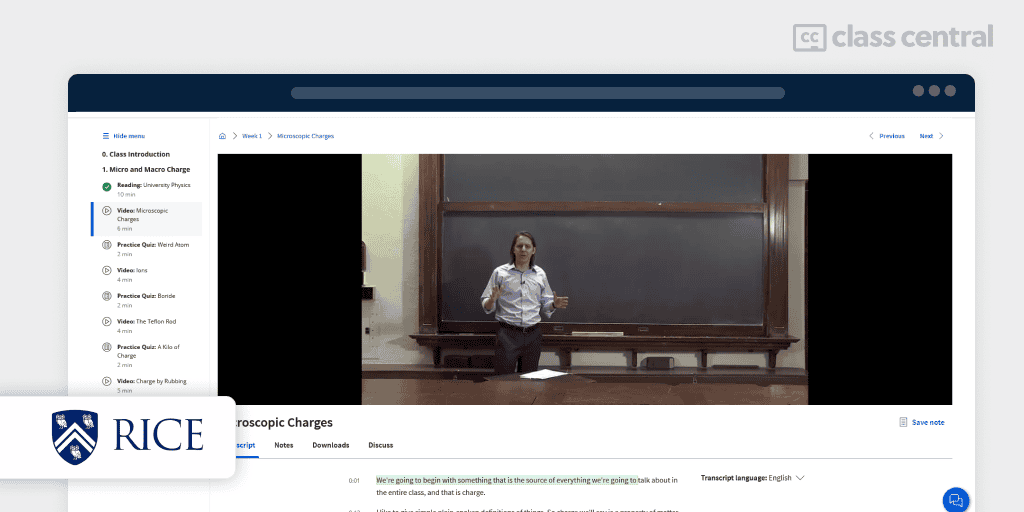
Physics 102 – Electric Charges and Fields is the first course in the Introduction to Electricity and Magnetism Specialization. Suitable for beginners, it includes comprehensive video lectures, free ungraded quizzes, and homework problems based on a free online textbook. The course is designed to prepare you for further studies in physics, mirroring the rigor of on-campus classes.
This course includes:
- Electric charges and forces, charge properties and interactions
- Electric fields, concepts and calculations, vector analysis in electric fields
- Applications and problem-solving with Gauss’s Law.
The other courses in this Specialization are:
- Physics 102 – Electric Potential and DC Circuits (22 hours)
- Physics 102 – Magnetic Fields and Faraday’s Law (26 hours)
- Physics 102 – AC Circuits and Maxwell’s Equations (18 hours).
And if you like Jason Hafner’s teaching style, check out his other Specializations: Introduction to Mechanics and the recently-released Physics of Waves and Optics.
“Professor Hafner is one of the best instructors i’ve ever had, from the explanations of derivations to the numerous demos and the occasional jokes, it has been a great experience.” – R.T., Coursera learner.
| Provider | Coursera |
| University | Rice University |
| Instructor | Jason Hafner |
| Time Commitment | 22 hours |
| Enrollment | 10.8K |
| Rating | 4.7/5.0 (57) |
| Cost | Free audit |
| Quizzes/Exam | Behind paywall |
| Certificate | Paid |
Best Basic Course on Einstein’s Special Theory of Relativity (Brian Greene)
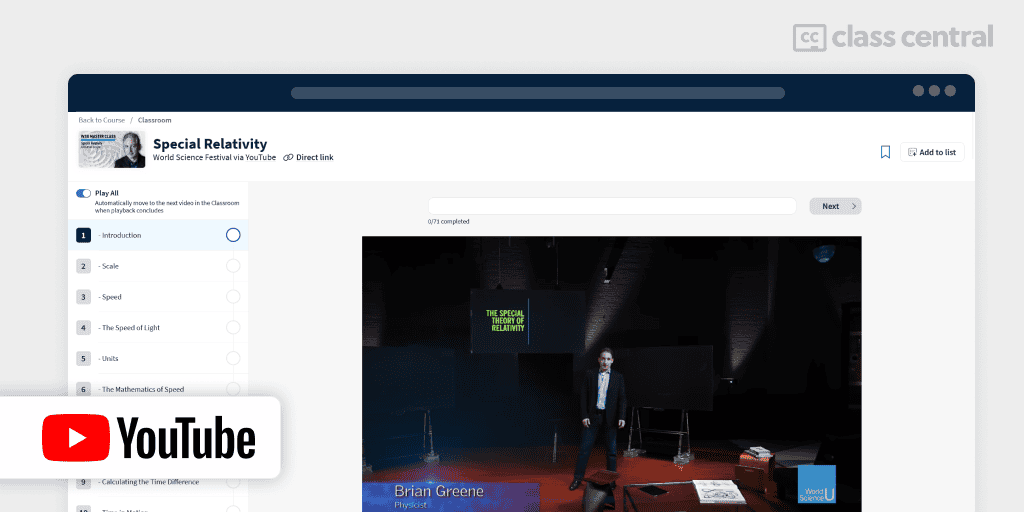
If you’re a physics beginner and not keen on calculations, Space, Time and Einstein offers a free introductory approach to Einstein’s theories. It’s an abridged version of Greene’s Special Relativity course (featured in my Best Relativity Courses guide). It does not include some of the more complex topics, and there are no problems, discussions, or exercises.
Watch the interesting videos on these topics:
- Scale
- Speed
- The Speed of Light
- Relativity of Simultaneity
- Time in Motion
- Time Dilation: Experimental Evidence
- The Reality of Past, Present, and Future
- Motion’s Effect on Space
- The Pole in the Barn Paradox
- The Twin Paradox
- Implications for Mass: Intuitive Explanation
- Space, Time and Einstein—Course Recap.
“A good look back or forward on how far we have come and where we are going…” – James Guatar, Class Central learner.
| Provider | World Science U |
| University | Columbia University |
| Instructor | Brian Greene |
| Time Commitment | N/A |
| Rating | 4.8/5.0 (6) |
| Cost | Free |
| Quizzes/Assessment Items | None |
| Certificate | None |
Best Course on the Higgs Boson (University of Edinburgh)
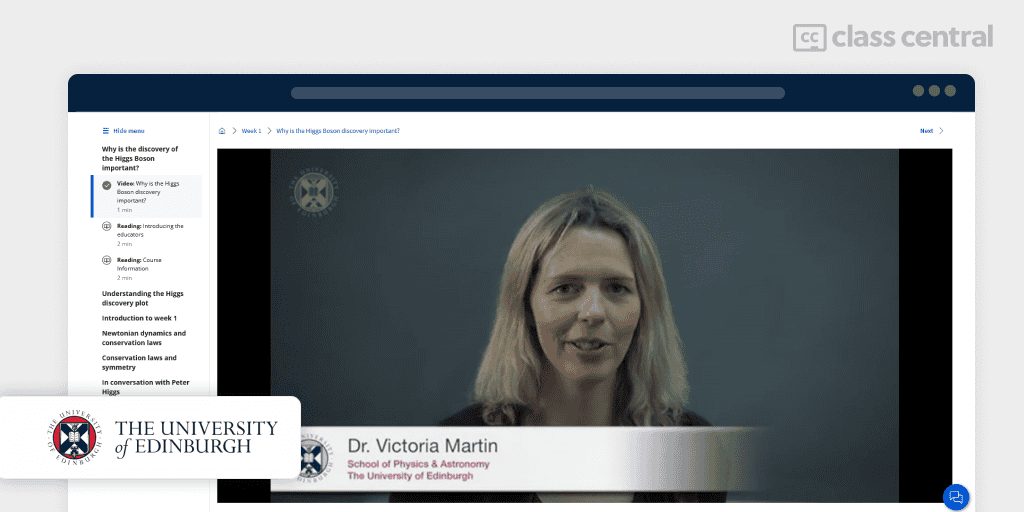
I was delighted to see The Discovery of the Higgs Boson is now available on the Coursera platform.
This free course explores the discovery of the Higgs Boson at CERN, its implications, and the theoretical tools needed to understand it. It covers classical mechanics, relativity, quantum mechanics, forces, matter, and the unification of theories. It also looks into experimental results leading to the 2012 discovery and discusses the consequences of the Higgs boson on physics and cosmology. The course is suitable for beginners as it starts with basic concepts in classical mechanics.
Syllabus:
- Theoretical description of physical phenomena
- A theory of matter and light
- From QED to QCD and the weak force
- The Brout-Englert-Higgs mechanism and the Standard Model
- Experimental evidence for the Standard Model
- Beyond the Standard Model
If you prefer the FutureLearn platform, go to this link instead: The Discovery of the Higgs Boson.
“This was a very comprehensive course covering the history and physics of the Higgs Boson from its proposal, in 1964, to its discovery and after…” – John S., FutureLearn learner.
| Provider | Coursera |
| University | University of Edinburgh |
| Instructor | Del Debbio, Christos Leonidopoulos, Victoria Martin, and Kristel Torokoff |
| Time Commitment | 17 hours |
| Enrollment (FutureLearn) | 38K |
| Rating (FutureLearn) | 4.7/5.0 (14) |
| Cost | Free |
| Quizzes | Free |
| Certificate | Paid |
What Else?
If you want to ask questions or discuss physics with other interested students, try these Reddit communities: r/Physics and r/learnphysics. You can also search Reddit for specific aspects of physics.
Stackexchange is another popular community: https://physics.stackexchange.com/
Or if you’re searching for more online courses on physics, see 650+ Physics Online Courses You Can Take for Free, or for even more choice, here is our Physics subject.
Why You Should Trust Us
Class Central, a Tripadvisor for online education, has helped 60 million learners find their next course. We’ve been combing through online education for more than a decade to aggregate a catalog of 200,000 online courses and 200,000 reviews written by our users. And we’re online learners ourselves: combined, the Class Central team has completed over 400 online courses, including online degrees. I’ve personally completed over 200 online courses in a variety of topics.
How We Made Our Picks and Tested Them
Here’s how I approached the task of finding the best online courses from more than 1400 Physics courses in Class Central’s Catalog.
I combed through the catalog and the internet to find a variety of free and paid open courses, some with certificates. You don’t need to enroll in a university to learn about physics.
When choosing courses, I considered the following factors:
- Renowned Institutions: I looked for recognized institutions in physics
- Instructor experience: I sought instructors with extensive experience in physics and engaging presentation styles
- Popularity: I checked numbers of enrollments and views to find popular courses
- Course content: I examined courses that covered a range of topics and presentation styles, including the basics and more advanced topics. I watched some course videos to sample courses I hadn’t already taken
- Learner reviews: I read learner reviews (when available) to get a sense of the quality of each course, leveraging the Class Central database with its thousands of course ratings and reviews written by our users as well as available course provider reviews.
Then, I defined the scope for these recommendations. A physics course can cover various topics, so I chose top general physics courses and from a range of sub-fields.
Ultimately, I used a combination of data and my own judgment to make these picks. I’m confident these recommendations will be a reliable way to learn physics.








